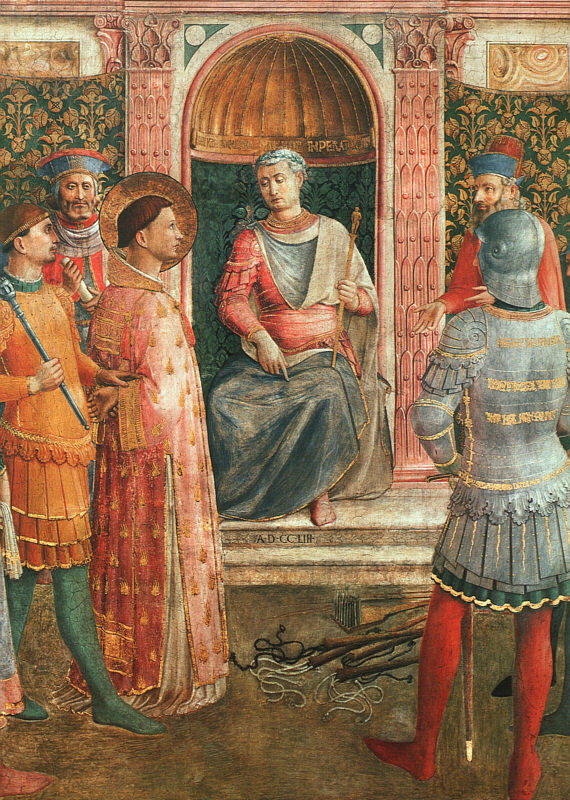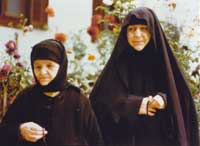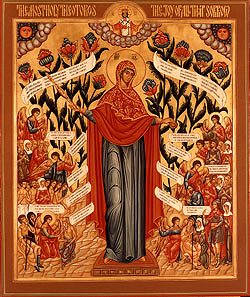![]() (Source)
(Source)
From Exomologetarion (A Manual of Confession), by St. Nikodemos the Hagiorite (Thessaloniki, Greece: 2006, Uncut Mountain Press).
Just as so-called diagnostic physicians not only know how to treat external and visible wounds of the body, but also, by measuring the pulse, they learn the internal and invisible maladies of the heart, of the bowels, and the other unseen workings of the human body, and are therefore able to treat them. Likewise, Spiritual Father, it is not enough for you only to know how to treat the external passions of the soul, those acts and deeds and effects of sin, but it is also necessary to know through the confession of the penitent the internal wounds of his soul, which are the hidden passions in his heart and the passionate and evil thoughts, and so treat them with great scrutiny and care. For this reason we thought it good to inform you a little about some general and vital matters concerning thoughts.
How many types of thoughts there are
Know then, Spiritual Father, that in general, all thoughts are of three types: some thoughts are good, some thoughts are vain and idle, and some thoughts are bad. Concerning good thoughts, it is not necessary to discuss here in detail how and from what aspects of the soul they arise, for we are satisfied that these are good and therefore beneficial and salvific to the soul. We say this only, Spiritual Father, that if someone says to you during confession that he has good thoughts, you should counsel him to take care to be humble and to never trust in himself and become prideful: 1) because a person on his own is not able to do a good work or say a good word or even think a good thought without the power and help of God: “Not that we are sufficient of ourselves to think any thing as of ourselves; but our sufficiency is of God” (2 Cor. 3:5); 2) because the devil is so cunning and evil, that many times he brings evil from good and through good thoughts throws those who are not careful into self-esteem, and conceit, and haughtiness, from which is caused the destruction and death of the soul. So says Paul: “Sin, that it might appear sin, working death in me by that which is good” (Rom. 7:13); 3) because man never remains in one state, but is so changing and so quickly alters that, with his thoughts, in one instant he is found in Paradise and in another instant he is in hell, as one Saint said. And St. Isaac says: “By the mind we improve, and by the mind we become unprofitable,”[1] hence the one who today has good thoughts may very well have evil ones tomorrow; and 4) tell him that the devil has greater envy and wages a fiercer battle against those who have good thoughts, so that he should have more fear and greater care over himself.
What vain thoughts are and how they are corrected
Those thoughts which are not profitable unto the purpose and aim of salvation, as much as to our own soul as to that of our neighbor, and do not look to the necessary requirements and constitution of our body, but to the superfluous and more-than-necessary things, even if they are good, I call vain and idle. According to the Shorter Rules of Basil the Great, vain and idle thoughts arise from the idleness of the intellect that is neither engaged in necessary things, nor believes that God is present and searches our hearts and thoughts: “Mental aberration comes from idleness of a mind not occupied in necessary things. For the mind is idle and careless from lack of belief in the presence of God Who tries the heart and reins… He who does this and what is like to it will never dare or have leisure to think of any of those things that do not conduce to the edification of faith, even if they seem to be good.”[2] Concerning these vain and idle thoughts, I say, advise the penitent not to allow his intellect to meditate upon or ponder over them: 1) because just as we have to give an account for idle words on the day of judgment, as the Lord said: “But I say unto you, That every idle word that men shall speak, they shall give account thereof in the day of judgment” (Mt. 12:36), so likewise we have to give an account on the day of judgment for idle and vain thoughts, and indeed, if we willfully left our intellect to go after them.[3] And it is thence apparent, because the Lord reproaches and condemns those servants who remain idle: “Why stand ye here all the day idle?” (Mt. 20:6); 2) because those vain thoughts deprive us from profitable and salvific thoughts, which we are able to have instead of them; and 3) because these idle thoughts are in themselves evil, as they are the cessation of good and become the beginning of evil, and as giving way and permission to the devil to sow in our idle intellect the tares of evil thoughts. Thus does Gregory the Theologian confirm this: “May evil and its original cause, the devil, be destroyed. For while we were idle, the evil one planted tares in us (cf. Mt. 13:25), in order that the neglect of good might become the beginning of evil, just as the beginning of darkness is the retreat of light.”[4]
The causes of bad thoughts
Know that, in general, bad thoughts derive from two causes,[5] one external and the other internal. The external cause of bad thoughts is the sensible objects of the five senses, that is, those things seen, heard, smelled, tasted, and touched, like bad and indecent and theatrical sights, obscene words and lewd songs, scents and colognes and perfumes, luscious foods and pleasurable drinks, fine and soft clothes and comfortable mattresses. All these things cause passionate and hedonistic thoughts in the soul, and then sinful and death-bearing thoughts. Thus, the Prophet Jeremiah on one hand says: “Death has come up into our windows” (Jer. 21:9), the windows meaning the five senses. On the other hand, Gregory the Theologian rather interpreted this saying in broader terms: “And it is kept until the fifth day (that is, the sacrificed Paschal Lamb), perhaps because the Victim, of Whom I am speaking, purifies the five senses, from which comes falling into sin, and around which the war rages, inasmuch as they are open to the incitements to sin.”[6]
The internal causes of bad thoughts
The internal causes of bad thoughts are four:
1. The imagination, which is like a second sense and receives and records all of the images and perceptions which enter through the five senses, that is, of those things touched, tasted, smelled, and especially of those things heard and seen, is called an internal sense, because it portrays the things sensed so grossly and clearly, just as the external senses. It is a common sense, according to Aristotle, because it receives commonly the experiences of all the senses; and this naturally, because just as lines are disconnected at the perimeter of a circle but converge at its center, so also the five senses, which are disconnected on the outside, converge in the imagination of the soul, but they converge without confusion. So then, from the imagination are born bad thoughts in the soul, making it sense them as really present and to noetically conceptualize through memory those things that it should not have outwardly seen or heard or smelled or tasted or touched, even though it is sensibly far from these things and is settled peaceably in a deserted place. For this reason, in his tetrastich Iambic Poetry, the Theologian said:
“A vision caught me, but was checked.
I set up no idol of sin.
Was an idol set up? The experience was avoided.
These are the degrees of deceit of the adversary.”[7]
Do you hear? He says an idol of sin was set up and was not recorded in the imagination. The soul escaped the experience at once, that is, it escaped from consenting to the thoughts and from the committal of sin.
2. The passions are a cause of bad thoughts, which are generally two: love and hate, or pleasure and pain, for we are moved passionately either because we love something as pleasurable, or because we hate it as painful.[8] Specifically, the passions are divided into the three aspects of the soul: the intelligent, the appetitive, and the incensive. The passions of the intelligent aspect, according to Gregory of Sinai, are unbelief, blasphemy, evilness, curiosity, double mindedness, gossip, love of applause, pretension, pride, and others. The passions of the appetitive aspect are fornication, adultery, debauchery, greed, unchastity, incontinence, love of pleasure, self-love, and others. The passions of the incensive aspect are anger, bitterness, shouting, audacity, revenge, and others. From these passions of the soul, then, bad thoughts are generally and immediately born, these also being divided into three categories like the passions. From the passions of the intelligent aspect of the soul come bad thoughts, which are generally given the name blasphemous thoughts. From the passions of the appetitive aspect come the so-called obscene thoughts. From the passions of the incensive aspect come the so-called evil thoughts. For this reason the above-mentioned Gregory of Sinai said that: “The passions are the causes of thoughts,”[9] and Abba Isaac also calls the passions assaults, because they attack within the soul and stir up passionate thoughts.[10]
3. An internal and initial cause of bad thoughts is the demons, for those accursed ones, being light spirits and found superficially around the heart, speak there through internal suggestion and whisper softly from inside all the blasphemous thoughts, all the obscene thoughts, all the evil thoughts, and simply all the bad thoughts. They train the imagination with obscene and impure idols from the senses, as much as when a person is sleeping as when awake. From these the aforementioned passions in the three aspects of the soul are stirred up and make the wretched soul to be a cave of thieves and a slum of the passions. For this reason the above-mentioned Gregory of Sinai said: “Occasions give rise to thoughts, thoughts to imaginations, imaginations to the passions, and the passions give entry to the demons… but no one thing in the sequence is self-operative: each is prompted and activated by the demons. The imagination is not wrought into an image, passion is not energized, without unperceived hidden demonic impulsion,”[11] and in another place he says: “Thoughts are the promptings of the demons and precursors of the passions.”[12] In agreement with this, St. Isaac says, “I hold as a truth, nevertheless, that our intellect, without the mediation of the holy angels, is able of itself to be moved toward the good uninstructed; however, our senses (the interior ones, that is) cannot come to know evil or be incited by it without the mediation of the demons.”[13]
4. An internal cause of thoughts, however remote, is the passionate and corrupted condition of human nature which was brought about by the ancestral sin.[14] This condition remains in our nature also after baptism, not as ancestral sin as such (for this is removed through baptism, according to Canon 120 of Carthage), but as a consequence of the ancestral sin, for the exertion and test of our free will, and in exchange for greater crowns and rewards, according to the theologians. For after the fall the intellect lost its innocent memory and thought which it had fixed formerly only on the good; but now when it wishes to remember and think upon the good, it is immediately dispersed and also thinks upon the bad. For this reason the divine Gregory of Sinai said: “The source and ground of our thoughts is the fragmented state of our memory. The memory was originally simple and one-pointed, but as a result of the fall its natural powers have been perverted: it has lost its recollectedness in God and has become compound instead of simple, diversified instead of one-pointed.”[15]
![st. nikodemus]()
Endnotes
Note: Numbering does not match the book.
[1] The Ascetical Homilies of Saint Isaac the Syrian, Boston, 1984, Homily 69, p. 338. (Translator’s note: Hereafter, referred to as Ascetical Homilies. It should be noted that, when quoting from this work of St. Isaac, St. Nikodemos references the Greek printed text of 1770 by Nikephoros Theotokis which numbers the Homilies differently than the English language translation of Holy Transfiguration Monastery. See the Table of Homily Equivalences in the Holy Transfiguration Monastery edition, pp. cxiii-cxv.)
[2] Regulæ Brevius 21, PG 31, 1097B-1097C; tr. The Ascetic Works of Saint Basil.
[3] Translator’s note: Concerning thoughts, St. Mark the Ascetic says: “Never belittle the significance of your thoughts, for not one escapes God’s notice” (On the Spiritual Law 89); and again: “When you sin, blame your thought, not your action. For had your intellect not run ahead, your body would not have followed” (ibid. 119); (GrPhilokalia, pp. 95; 96; tr. The Philokalia, v. 1, pp. 116; 118).
[4] Oratio 19, 14, PG 35, 1060C.
[5] Concerning bad thoughts, see the footnote of Canon 2 of the Faster.
[6] Oratio 45, 14, PG 36, 641C; tr. NPNF (V2-07) p. 428. (Translator’s note: For a thorough discussion on the guarding of the senses, the imagination, the intellect, and the heart, see the work by St. Nikodemos, Symbouleutikon Encheiridion, and the English language translation, Nicodemos of the Holy Mountain: A Handbook of Spiritual Counsel, CWS, New York, 1989.)
[7] Carmina Moralia 33, PG 37, 932A-933A.
[8] Translator’s note: St. Maximos the Confessor says: “Let us reject the pleasure and pain of this present life with what strength we have, and so free ourselves entirely from all thoughts of the passions and all machinations of the demons. For we love the passions because of pleasure and avoid virtue because of pain” (Third Century on Various Texts of Theology 52, GrPhilokalia, p. 369; tr. First Century of Various Texts, The Philokalia, v. 2, p. 175). On the interconnectedness of pleasure and pain, see especially Sixth Century on Various Texts of Theology 33-50, GrPhilokalia, pp. 412-416; Fourth Century of Various Texts, The Philokalia, v.2, pp. 243-248.
[9] On Commandments and Doctrines 62, GrPhilokalia, p. 886.
[10] Ascetical Homilies, Homily 62.
[11] On Commandments and Doctrines 70, GrPhilokalia, p. 887; tr. The Philokalia, v. 4, p. 224.
[12] Ibid. 67, GrPhilokalia, p. 886; tr. The Philokalia, v. 4, p. 223.
[13] Ascetical Homilies, Homily 28, p. 138.
[14] Translator’s note: St. Mark the Ascetic says: “When evil thoughts become active within us, we should blame ourselves and not ancestral sin” (No Righteousness by Works 120, GrPhilokalia, p. 106; tr. The Philokalia, v. 1, p. 135). And St. Diadochos of Photiki writes: “For although baptism removes from us the stain resulting from sin, it does not thereby heal the duality of our will immediately, neither does it prevent the demons from attacking us or speaking deceitful words to us. In this way we are led to take up the weapons of righteousness, and to preserve through the power of God what we could not keep safe through the efforts of our soul alone” (On Spiritual Knowledge 78, GrPhilokalia, p. 225; tr. The Philokalia, v. 1, p. 280).
[15] On Commandments and Doctrines 60, GrPhilokalia, p. 886; tr. The Philokalia, v. 4, p. 222.
![]()
![]()

 In my opinion this miracle of St. Euphemia is a great reminder for our times that there are reasons the Orthodox Church is not in communion with those who follow the teachings of Dioschorus and/or Eutychius. The division between the Orthodox tradition and that of the monophysites, or Anti-Chalcedonians, was not the result of a misunderstanding, but of divine revelation. God revealed which of the two theologies was divinely inspired through His handmaiden Euphemia the All-Praised.
In my opinion this miracle of St. Euphemia is a great reminder for our times that there are reasons the Orthodox Church is not in communion with those who follow the teachings of Dioschorus and/or Eutychius. The division between the Orthodox tradition and that of the monophysites, or Anti-Chalcedonians, was not the result of a misunderstanding, but of divine revelation. God revealed which of the two theologies was divinely inspired through His handmaiden Euphemia the All-Praised.
 (
(


 MARINA
MARINA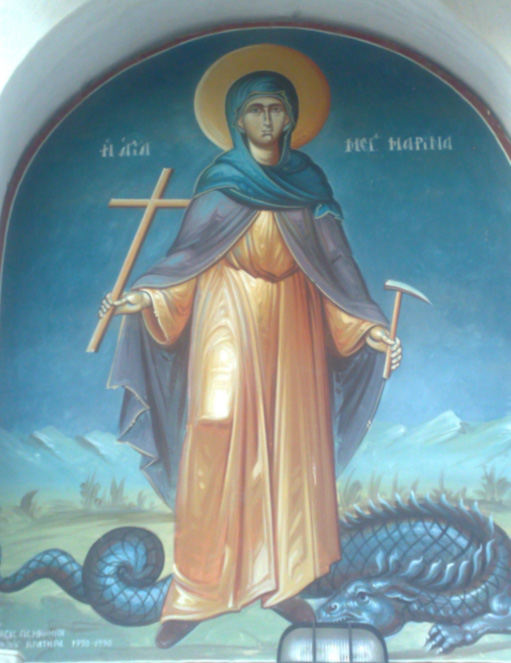 MARINA
MARINA

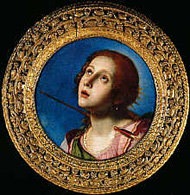 When day had gone and night had come, they tied an exceedingly heavy stone around her neck, then they threw her into the sea. But once that evil deed had been done, lovely angels came from heaven and, through God’s grace and great power, held her up. Then Christ himself through God’s grace and great power, held her up. Then came down and baptized Christine in the sea. It w is written that he said these very words: “In my father and in myself Jesus Christ, God’s heavenly son, and in the holy ghost, us three, I baptize you with the water.”
When day had gone and night had come, they tied an exceedingly heavy stone around her neck, then they threw her into the sea. But once that evil deed had been done, lovely angels came from heaven and, through God’s grace and great power, held her up. Then Christ himself through God’s grace and great power, held her up. Then came down and baptized Christine in the sea. It w is written that he said these very words: “In my father and in myself Jesus Christ, God’s heavenly son, and in the holy ghost, us three, I baptize you with the water.”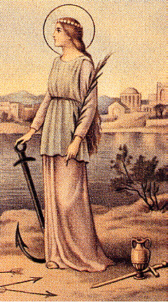



















 Ode 6-9 of the Supplicatory Canon to St. Xenia of St. Petersburg are sung in these two videos. I listen to them all the time, and thought you might enjoy praying to St. Xenia as well.
Ode 6-9 of the Supplicatory Canon to St. Xenia of St. Petersburg are sung in these two videos. I listen to them all the time, and thought you might enjoy praying to St. Xenia as well.





 On November 5, following the Divine Liturgy and a Molieben in the Cathedral of Christ the Savior, a monk removed one of the three ballots from the ballot box, which stood before the Vladimir Icon of the Mother of God. Metropolitan Vladimir of Kiev announced Metropolitan Tikhon as the newly elected Patriarch. St Tikhon did not change after becoming the primate of the Russian Orthodox Church. In accepting the will of the council, Patriarch Tikhon referred to the scroll that the Prophet Ezekiel had to eat, on which was written, “Lamentations, mourning, and woe.” He foresaw that his ministry would be filled with affliction and tears, but through all his suffering, he remained the same accessible, unassuming, and kindly person.
On November 5, following the Divine Liturgy and a Molieben in the Cathedral of Christ the Savior, a monk removed one of the three ballots from the ballot box, which stood before the Vladimir Icon of the Mother of God. Metropolitan Vladimir of Kiev announced Metropolitan Tikhon as the newly elected Patriarch. St Tikhon did not change after becoming the primate of the Russian Orthodox Church. In accepting the will of the council, Patriarch Tikhon referred to the scroll that the Prophet Ezekiel had to eat, on which was written, “Lamentations, mourning, and woe.” He foresaw that his ministry would be filled with affliction and tears, but through all his suffering, he remained the same accessible, unassuming, and kindly person.
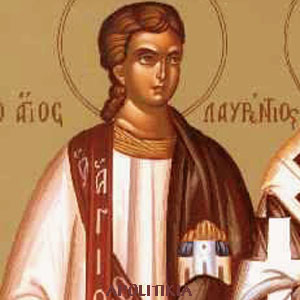 Last week we celebrated the memory of our Holy and God-bearing Father, Anthony the Roman and in so doing we were reminded that Orthodoxy had at one time been embraced by the West before it was led away into the pride and arrogance of heresy. According to Saint Justin Popovic, there have been three great Falls in the world’s history: first that of the angels, second that of Judas and third that of the Pope. And O, brothers and sisters, how great a Fall it was! For before the Schism the West bore great fruit in all areas of the spiritual life. It produced great ascetics like Saint John Cassian, and Saint Benedict of Nursia; it produced great hierarchs like Saint Gregory the Great, whose work The Pastoral Rule is unsurpassed in Patristic literature, and Saint Paulinus of Nola, who sold himself into slavery in order to free one of his flock who had been taken captive; it produced great theologians like Saint Hilary of Poitiers and Saint Leo the Great, Popes of Rome, who defended the Orthodox faith during a period when many in the East were wavering; it produced devout rulers like Saint Edward, King of England; and it produced many, many martyrs for the Orthodox faith. Crowning these is the Saint whose memory we keep today, the Holy, Glorious and Right-victorious Martyr, Laurence the Archdeacon of Rome.
Last week we celebrated the memory of our Holy and God-bearing Father, Anthony the Roman and in so doing we were reminded that Orthodoxy had at one time been embraced by the West before it was led away into the pride and arrogance of heresy. According to Saint Justin Popovic, there have been three great Falls in the world’s history: first that of the angels, second that of Judas and third that of the Pope. And O, brothers and sisters, how great a Fall it was! For before the Schism the West bore great fruit in all areas of the spiritual life. It produced great ascetics like Saint John Cassian, and Saint Benedict of Nursia; it produced great hierarchs like Saint Gregory the Great, whose work The Pastoral Rule is unsurpassed in Patristic literature, and Saint Paulinus of Nola, who sold himself into slavery in order to free one of his flock who had been taken captive; it produced great theologians like Saint Hilary of Poitiers and Saint Leo the Great, Popes of Rome, who defended the Orthodox faith during a period when many in the East were wavering; it produced devout rulers like Saint Edward, King of England; and it produced many, many martyrs for the Orthodox faith. Crowning these is the Saint whose memory we keep today, the Holy, Glorious and Right-victorious Martyr, Laurence the Archdeacon of Rome.